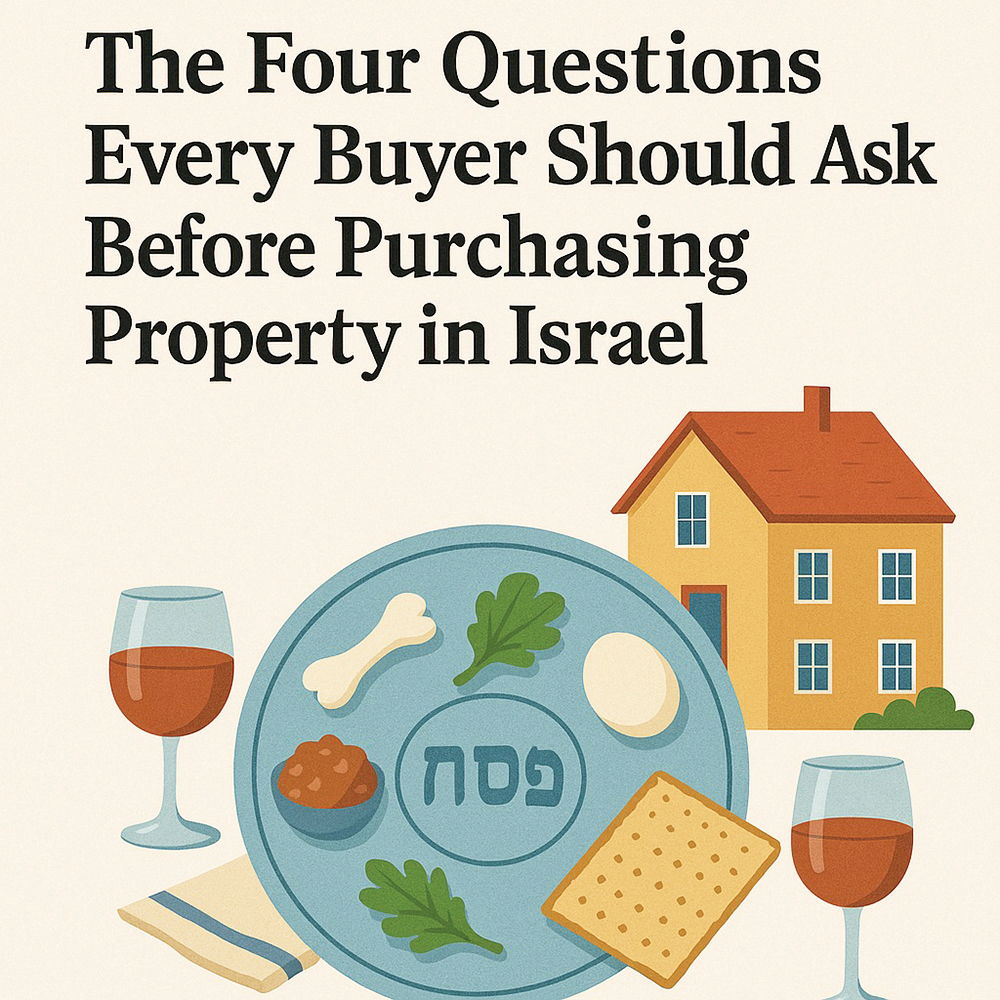
Pesach isn’t just a holiday; it’s a story of freedom, purpose and coming home.
Every year, as we sit around the Seder table and retell the story of our journey from Egypt to the Land of Israel, we’re reminded that this land was always the destination. And today, with everything happening around the world, that message feels more real—and more urgent—than ever.
For many, buying property in Israel is more than an investment. It’s a statement of connection. Of belonging. Of building a future in our Holy Land. But the buying process is different from what most are used to in the U.S.—and for olim and foreign buyers, the learning curve can be steep.
Here are four questions that cover key information every potential buyer should know:
- What additional/hidden costs should I be aware of?
When calculating the cost of a property in Israel, many buyers look only at the purchase price. But that’s just one piece of the puzzle.
Here are some of the additional expenses to budget for:
Purchase Tax (Mas Rechisha): This can vary significantly depending on your status (new oleh, resident, foreign buyer, etc.).
Legal Fees: Usually 0.5-1.5% of the purchase price, depending on the complexity of the deal.
Real Estate Agent Fees: Typically 1-2% + VAT, unless you’ve negotiated otherwise.
Currency Transfer Fees: Converting and transferring large sums from abroad? You’ll want to speak to a reputable currency transfer provider to minimize losses.
Appraisal, Inspection, or Mortgage Fees: If you’re financing your purchase, expect additional bank-related costs.
A smart buyer should budget an extra 7-10% on top of the sale price to cover all ancillary costs. Knowing these upfront will prevent surprises later.
- Is the property registered properly?
It sounds simple, but this is one of the most important—and misunderstood—parts of the buying process. In Israel, not all properties are fully registered in the national land registry (Tabu).
Some are still under construction. Others may be owned through leasing structures, such as land owned by the Israel Land Authority (Minhal), religious foundations, or private developers.
Before you make an offer, it’s crucial to verify the following:
Who legally owns the property
What rights are being transferred
If there are any existing liens, debts or encumbrances
Whether the property is registered in Tabu, Minhal, or a development company
Improper or incomplete registration can delay your closing—or worse, compromise your legal rights. Always have a qualified Israeli real estate lawyer conduct due diligence before any agreements are signed.
- Do I really need a real estate attorney for the transaction?
In Israel, real estate contracts aren’t just ceremonial—they’re binding, detailed legal documents that define your rights and responsibilities. Unlike in some countries, verbal agreements carry little to no legal weight here.
Unfortunately, many contracts are written with the seller’s interests in mind—especially if you’re using their lawyer or signing too quickly.
While real estate attorneys in the U.S. play more of an administrative role in a property purchase, in Israel, it is very different. Israeli property contracts aren’t just formalities—they’re detailed legal documents
packed with crucial clauses that directly impact your rights. The real estate attorney plays a pivotal role, and it’s crucial the lawyer reviews your contract thoroughly to ensure your rights are protected and everything with the property is ’kosher’.
Without an attorney who specializes in Israeli real estate law, you could unknowingly agree to terms that favor the seller, exposing you to costly risks. While this may add another expense to your transaction, it will ensure your peace of mind and protection in your very important purchase.
- Will I be eligible for any discounts as a foreigner or oleh?
Yes, but it depends on your status and how the deal is structured.
Olim Hadashim may qualify for significant purchase tax (Mas Rechisha) discounts, usually within seven years of aliyah and only if the benefit hasn’t been used before. Timing matters—even the date you sign can impact your eligibility.
Other strategies, like buying through a trust or in a child’s name, may also reduce taxes—but only with proper planning.
Tax rules are complex and change often. A real estate attorney can help you structure your deal correctly and potentially save thousands of shekels.
Next Year in Jerusalem.
Every Pesach, we say, “Next year in Jerusalem.” For many, that’s no longer a dream—it’s a plan.
Now is the time. With changes in the market, a global shift in priorities, and the growing importance of having a foothold in Israel, there’s never been a more meaningful moment to take the next step.
If you’re thinking about buying, don’t go it alone. Ask the right questions. Get the right team. Make this year the one where you turn that dream into a reality.
The information provided in this article is for informational purposes only and should not be construed as legal or financial advice. The opinions expressed herein are those of the author. Readers are advised to consult with qualified professionals for specific advice tailored to their individual circumstances. The author and any affiliated parties shall not be held liable for any decisions made or actions taken based on the information contained in this article.
Sammy Fragin is a real estate adviser and client manager at Haim Givati Law, focusing on simplifying the real estate process for foreign buyers and olim, and helping them navigate confidently through Israel’s property landscape. Check out givatilaw.co.il or email sammy@givatilaw.co.il for more articles and info.







